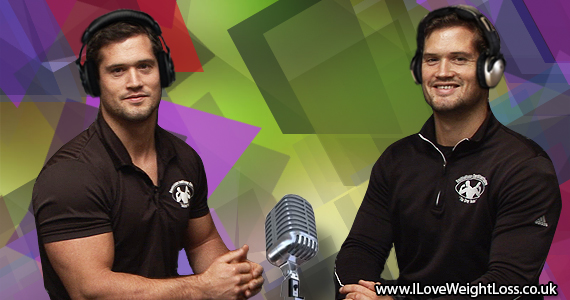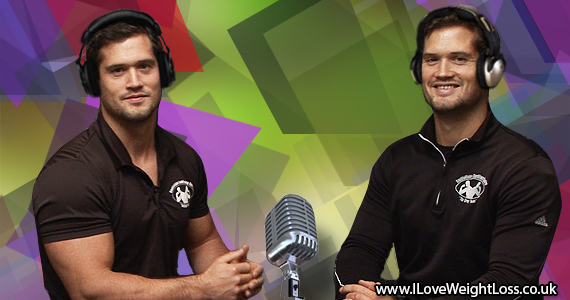
I hear this phrase a lot and it really annoys me.
Its often said in between puffs of a cigarette.
In this latest podcast Stephen gets somewhat annoyed by the short-term attitude some people seem to have..
Why do you want to live part of your life in ill health?
Highlights of the Podcast:
- McDonalds packed with people is a prime example of living for the day
- People don’t connect what they do nutrition-wise now to how it will affect them in the future
- Rather than asking what happens if you die tomorrow, ask what happens if you live?
- Create good habits now and living healthily isn’t hard
- The Lifetime Extender Technique
Transcript:
Mark: Hi! This is Mark and Steve from TheDVCC.com.
Stephen: Hello!
Mark: And today, we’ve got a new podcast. We’re here recording actually in a recording studio today. So I hope that we get good sound. I’d like to say hello to Toffee, our Sound Engineer, sitting there in the corner, smiling away, or not really.
Stephen: He looks pretty bored, to be honest.
Mark: Pretty bored. Yeah. But anyway, let’s go! Basically, we wanted to – well, Stephen actually chose this topic, as he sometimes does. And it was inspired by a little walk along the street, I think.
Stephen: Well, it’s inspired by a shopping trip. Well, I was I would say dragged along, but hopefully my girlfriend is not listening to this, but I went shopping the other Sunday and we were walking around Milton Keynes. And I don’t know if anyone’s been there, but there’s about a gazillion shops.
Mark: Pretty much, and a few people have been there. Actually, I think it’s the biggest in Europe.
Stephen: It’s massive. Anyway, it seems to get bigger and bigger every time and there are more and more girl shops. I didn’t see there being any more boy shops, but there seems to be more girl shops that I have to go in. And we were walking around. I was a little bit tired by this stage, a little bit moody, I have to say, and I’m not normally happy when I’m going clothes shopping, and we walked past McDonalds. So I looked in and it was packed. It was full and full of people. Loads and loads of children; children, families, couples, and they’re obviously all getting McDonalds to eat. And it kind of struck me that it was a prime example of living for the day. And I’ve had this – well, we’ve both had this level to us quite a lot – “Oh, why don’t you just live?”
Mark: You only live once.
Stephen: “You only live once. Why don’t you live for the day?” And I thought actually, that is an absolute case of living for the day because you’re not thinking about the future, you’re not thinking about what you’re doing to yourself. You’re literally living for the day because you’re assuming that, I guess, that you’re not worrying about what that food is going to do to you in 5, 10, 15 years’ time. And I find that attitude a little bit strange personally because when you cross the road, everyone looks left and looks right, don’t they? Because they’re worried about being hit by a car. And it’s kind of I see it in that sort of respect, in that sort of way now that it’s unequivocally kind of accepted now that the foods you eat, the lifestyle you lead, has an impact on your longevity, how long you live, or at least how long you live healthily as well. And I think the biggest thing I saw, I kind of figured was that people don’t connect what they do nutrition-wise now with what’s going to happen to them in the future. So whilst yes, you know that if you don’t look left and right when you cross the road, you’re going to get run over and you might die, people don’t see that with the food that they eat.
Mark: Right. Yeah. And we’ve got a fair few friends that live for the day and disregard what you’re doing now and the effects it’s going to have in the future. So like you say, yeah, you’d have a McDonalds now because if it affects you, it’s going to affect you 10 years down the line or whatever.
Stephen: And I’m not saying one McDonalds is going to make that difference, but I think it’s more an example. It’s not normally a case. People don’t just have one. It’s they won’t be exercising and they’ll be eating takeaways regularly. They won’t be looking after themselves, they may be smoking. They may be doing lots of different things that we now know. It’s not our opinion. It’s kind of accepted now that they have an impact on your health and cause disease. I guess you can liken this with people that smoke, and that they know that if you smoke, you’re going to get cancer. One out of two people will get cancer. Is that right? That’s the stat, isn’t it?
Mark: Uh-hm.
Stephen: If you smoke.
Mark: No. One out of two people will die.
Stephen: Will die of cancer. Sorry. That’s even worse.
Mark: Or related. That’s even worse.
Stephen: Right. Smoking-related.
Mark: But we have friends that smoke and they say, “I’m going to stop, but when I want to. I enjoy it now. I enjoy smoking,” which is fine. That’s his choice. But he’s disregarding what it’s going to go and do for him in the future. So he could stop at 40, but he’ll smoke for 20 years. And then, in the future, that’s when it’s going to cause him damage.
Stephen: But I always find it interesting because people are, in other aspects of their life, very good at connecting what they do with what happens to them. So talking about example, a few businessmen that very much know what they do now affects their thinking of their 5 year plan or their business plan, which is 5 or 10 years’ time, and they are thinking about what they’re doing now affecting that. But that’s the exact same thing. What is your effective business plan for your life? Because what you do now impacts your business or your body and your health in that year or a few years’ time. It doesn’t have to be in 20 years’ time. It can be in 5 years’ time, it could be in 10 years’ time.
And like Mark said, we don’t go around saying this to people. It’s everyone’s individual choice. But I just think sometimes people need to actually connect the two things. And people say to you, “Oh, what happens if you die tomorrow?” And I always, I’m kind of thinking, “Well, what happens if I don’t die tomorrow? Because yeah, I might eat that food now and eat that McDonalds and eat that takeaway and live an unhealthy life now, but what happens if I don’t die tomorrow because I’m going to be feeling rubbish, I’m not going to be healthy, I won’t be able to live my life tomorrow the same way as if I take care of myself today.”
So, when someone says that, “Oh, what happens if you die tomorrow?” Then actually, what happens if you live? Because one of the biggest fears – and this is true, this is a stat – that everyone’s biggest fear is getting ill, disease. Actually, I think cancer is the number one fear, but it’s not living healthy because what happens if you’re living longer. Yeah, sure. But not living healthy. Because there’s a big difference between being able to do what you want to do and enjoy your life and…
Mark: And you know what? You likened it to businesspeople, but you can liken it to mothers or fathers who try to impress on their children that it’s important that they learn, that they do well at school because it’s going to help them in the future. If they get good grades, they’ll be able to go to university and then get a good job. That kind of thing. They’re looking long term for their children in that respect, in education-wise, but not nutrition-wise perhaps. And that’s why it’s super important that you focus now on your nutrition for your future. So, you’ll live healthier now, but you’ll live healthier in 10, 20 years’ time.
And I think a lot of this comes around to actually people have an intrinsic kind of idea of when they’re going to live to. So for example, your parents, your grandparents and people around you, people kind of have an accepted opinion of how long they’re going to live for. And to clarify that, just basically, I guess it’s more subconscious as well that you identify when your great grandparents died, when your grandparents or even when your parents.
Stephen: Yeah. And I speak to people, a lot of different people, and they say, “Oh, my grandfather died at 70, my father died at 65,” blahdiblah. And they kind of have an opinion, subconscious or conscious, about when they are going to kind of die.
Mark: It’s a morbid subject.
Stephen: It sounds as a morbid subject, but I think sometimes it needs to be said to actually get people to kind of connect what they do now with what’s going to happen in the future, but what would happen if – and I have this discussion – is okay, imagine what do you want to be like the year before you do die? And this is actually a technique. It’s called the “Lifetime Extender,” but how do you want to be the year before you die. And people are, “Well, I want to be really fit, healthy, be able to move around.” “Okay. Mentally, how do you want to be?” “Yeah, I want my brain to be working fine. I want to be feeling really good, be active, can run around with the grandchildren and do all those different things.”
Mark: Good relationships.
Stephen: Good relationships. Happy, financially secure and all that sort of thing. Well, if that was the case, imagine that’s the case, why would you die? You wouldn’t, would you? You’d carry on. Why should you? And it’s not an accepted fact that we should die at 80 or 90. That’s not accepted. A lot of the studies show that we should actually be able to live a lot longer than that. But then why would you? Why would you die that year or after? You wouldn’t, would you, because you’re feeling healthy.
And the thing is, if you were to then extend, okay, so how many years further would you think you’d probably be able to carry on like that? Oh, another 20 years. So you’ve added another 20 years mentally to your life. How are you going to start living now, knowing that you’ve got another 40 or 50 years to live, rather than another 20? How would you start living? You start taking care of yourself, you’d start making sure that you are thinking longer term rather than thinking short term because what happens if you don’t die when you think you should do? You carry on living and you live healthily. You have to take care of yourself to be able to do that, don’t you?
Mark: They do. So they say that once you – like we’ve done these exercises and I think mine worked out about 132 is when I thought that that’s when I would live to, effectively.
Stephen: But live healthily and…
Mark: But live healthily too. So like I said, if you’re going to live to 132, at the age of 31 I’m only just at the precipice of realistically what I want to achieve in life, how I want to be physically, healthily, relationships-wise, everything. So therefore, your whole mindset shifts to more of a much progressive state, doesn’t it?
Stephen: And obviously, unlucky things happen. You can do everything right in the world, and then it’s unfortunate you get ill or what have you. However, on the whole, just intellectually, everyone will know that the healthier you live your life today, the healthier you’re going to be tomorrow on the whole, so start thinking as if you’re going to live a long time. Start thinking you want to be enjoying all of your time. Not living for today, and then being affected tomorrow negatively because tomorrow then goes to the day after and the day after that. There are quite a few days where you’re not going to be able to live healthily if you don’t take care of yourself now.
And the thing is as well and thinking about it, for example, as a parent, if you’re not taking care of yourself now, who’s going to have to look after you in the future? It’s obviously going to be your children on the most part, and I think it’s that connection that I find people don’t connect with about what they’re doing today affecting how they’re going to live their life tomorrow or in the future. And just by thinking of extending your subconscious mind on how long you’re going to actually live for, I think you’ll find that your choices are slightly different. You’re actually wanting to treat yourself better now so that you are in a much better place in the future.
Mark: And I guess part of that comes with education because there’ll be a portion of those people in McDonalds, for example, who don’t necessarily know.
Stephen: Yeah. It’s not a blame or anything.
Mark: You’re not a bad person or anything, but if you do know, then you can make a more informed choice. So now, you’ll have seen – if you haven’t and you just listened to this podcast and you haven’t seen the videos we’ve done on how much sugar is in Coke or how much sugar is in a cereal bar or Special K, check those out and you’ll see now you’re informed, you can make better choices and you know that those small, easily accessed snacks or whatever are going to be doing damage for you maybe not today, but for the future. So try and have, like Stephen says, a much more long term thought process. Think about how what you’re doing now is going to affect you in the future.
Stephen: Yeah. Exactly.
Mark: So, well lectured there, Stephen. It’s more we want you to give us feedback on what you think because you might be listening to this and thinking, “Oh, that’s rubbish! I’m YOLO, You Only Live Once, so I’m going to live for the day.” And if you do, let us know because it’d be good to have a conversation with you about it because there is no right or wrong answer, but in our opinion and our experience, if you can lead a healthy life for the most part, you’re going to have a much more rich or a healthier life for the long term. The small things you do now will affect you in the future.
Stephen: Well, it’s just that kind of my view on it is I want people to kind of see that they can have a much bigger future than they even imagined because they’re going to be that much healthier that much longer and be able to enjoy, do more things, live an effectively bigger life because they’re looking after themselves and can carry on living for as long as possible.
Mark: So, like we said, give us your feedback. Comment on TheDVCC.com. At the bottom, there’s a commenting box where you can pretty much comment if you use Facebook, Twitter or whatever you use. You can just write us a quick bit of feedback, and then we’ll be able to respond to you and we’ll actually mention you on the next podcast as well because it’s always good to bring out conversations that perhaps people haven’t seen in the different forms of feedback. So, go and comment now. Otherwise, we’ll see you next time on our TheDVCC.com podcast!
Stephen: Bye-bye.
Mark: This is Steve and Mark Gray. Bye-bye!
Stephen: Bye.







